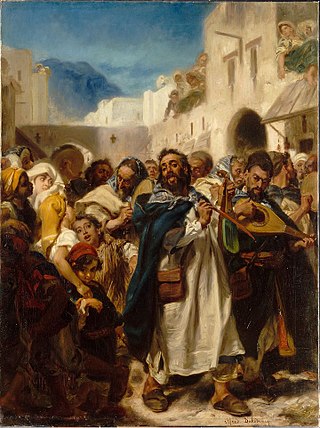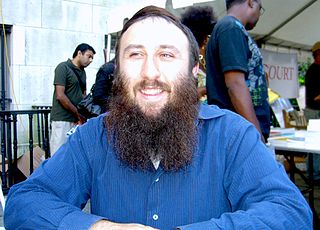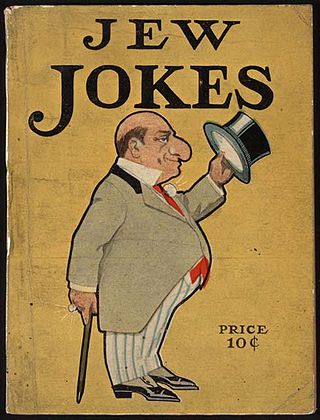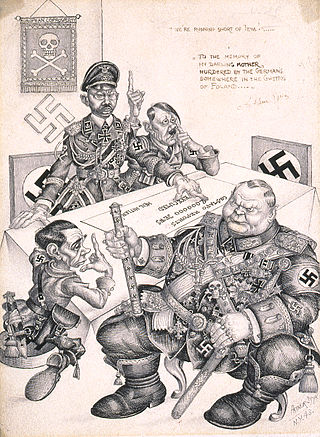
Jackie Mason was an American stand-up comedian and actor.

The tradition of humor in Judaism dates back to the Torah and the Midrash from the ancient Middle East, but generally refers to the more recent stream of verbal and often anecdotal humor of Ashkenazi Jews which took root in the United States over the last hundred years, including in secular Jewish culture. European Jewish humor in its early form developed in the Jewish community of the Holy Roman Empire, with theological satire becoming a traditional way of clandestinely opposing Christianization.
Jewish atheism refers to the atheism of people who are ethnically and culturally Jewish. Contrary to popular belief, the term "Jewish atheism" is not a contradiction because Jewish identity encompasses not only religious components, but also ethnic and cultural ones. Jewish law's emphasis on descent through the mother means that even religiously conservative Orthodox Jewish authorities would accept an atheist born to a Jewish mother as fully Jewish.

Jewish culture is the culture of the Jewish people, from its formation in ancient times until the current age. Judaism itself is not a faith-based religion, but an orthoprax and ethnoreligion, pertaining to deed, practice, and identity. Jewish culture covers many aspects, including religion and worldviews, literature, media, and cinema, art and architecture, cuisine and traditional dress, attitudes to gender, marriage, family, social customs and lifestyles, music and dance. Some elements of Jewish culture come from within Judaism, others from the interaction of Jews with host populations, and others still from the inner social and cultural dynamics of the community. Before the 18th century, religion dominated virtually all aspects of Jewish life, and infused culture. Since the advent of secularization, wholly secular Jewish culture emerged likewise.

Off-color humor is humor that deals with topics that may be considered to be in poor taste or vulgar. Many comedic genres may incorporate "off-color" elements.

Ray Hanania is an American journalist, editor, public relations expert, reporter, and stand-up comedian of Palestinian descent. After the September 11 attacks, he created the Israeli-Palestinian Comedy Tour and Comedy for Peace, which brought together Israeli and Palestinian comedians. He founded his own public relations firm, called Urban Strategies Group.

Andy David Kindler is an American comedian and actor from Queens, New York. He played the character "Andy", a fellow sportswriter and friend of sportswriter "Ray Barone" on the TV show Everybody Loves Raymond, was a regular guest on Late Show with David Letterman, contributor to The Daily Show, and has performed on HBO. Kindler frequently performs as a voice actor in animated television series from producer Loren Bouchard, including roles on Dr. Katz, Home Movies, and the recurring character of Mort the mortician on Bob's Burgers.
American humor refers collectively to the conventions and common threads that tie together humor in the United States. It is often defined in comparison to the humor of another country – for example, how it is different from British humor and Canadian humor. It is, however, difficult to say what makes a particular type or subject of humor particularly American. Humor usually concerns aspects of American culture, and depends on the historical and current development of the country's culture. The extent to which an individual will personally find something humorous obviously depends on a host of absolute and relative variables, including, but not limited to geographical location, culture, maturity, level of education, and context. People of different countries will therefore find different situations funny. Just as American culture has many aspects which differ from other nations, these cultural differences may be a barrier to how humor translates to other countries.

Carol Leifer is an American comedian, writer and producer whose career as a stand-up comedian started in the 1970s when she was in college. She has written many television scripts including The Larry Sanders Show, Saturday Night Live and Seinfeld. She has received four Primetime Emmy Award nominations for The Larry Sanders Show, Seinfeld, the 82nd Academy Awards and the 84th Academy Awards. Leifer's inner-monologue driven, observational style is often autobiographical, encompassing subjects about her Jewish ancestry and upbringing, coming out, same-sex marriage, relationships and parenting.

Simon Weinstein, known by his Hebrew name Simcha Weinstein, is an English author and a rabbi. In 2006, his first book, Up Up and Oy Vey: How Jewish History, Culture and Values Shaped the Comic Book Superhero, was published. In 2008, his second book, Shtick Shift: Jewish Humor in the 21st Century, was published.
Israeli–Palestinian Comedy Tour was founded in November 2006 by Palestinian comedian and columnist Ray Hanania and Israeli comedian and online Podcaster Charley Warady. Arab-American Palestinian comedian and award-winning journalist Ray Hanania and his companions from the Israeli–Palestinian Comedy Tour operate under the slogan: "If we can laugh together, we can live together".

Stereotypes of Jews are generalized representations of Jews, often caricatured and of a prejudiced and antisemitic nature.

Comedy is a genre of fiction that consists of discourses or works intended to be humorous or amusing by inducing laughter, especially in theatre, film, stand-up comedy, television, radio, books, or any other entertainment medium. The term originated in ancient Greece: In Athenian democracy, the public opinion of voters was influenced by political satire performed by comic poets in theaters. The theatrical genre of Greek comedy can be described as a dramatic performance pitting two groups, ages, genders, or societies against each other in an amusing agon or conflict. Northrop Frye depicted these two opposing sides as a "Society of Youth" and a "Society of the Old". A revised view characterizes the essential agon of comedy as a struggle between a relatively powerless youth and the societal conventions posing obstacles to his hopes. In this struggle, the youth then becomes constrained by his lack of social authority, and is left with little choice but to resort to ruses which engender dramatic irony, which provokes laughter.
American-Jewish comedy is, in part, a continuation of the traditional role of humor in Jewish culture among historical and contemporary American performers. It has appealed to both Jewish and wider mainstream audiences. At various times in American history, the field of comedy has been dominated by Jewish comedians.

When Jews Were Funny is a 2013 Canadian documentary comedy film, directed by Alan Zweig. It was produced by Jesse Ikeman and Jeff Glickman for Sudden Storm Entertainment. The film features two dozen interviews with a variety of Jewish comedy professionals in North America and explores the role of Jewish humour in the context of North American comedy. The filmmaker asks whether earlier generations of Jews were funnier than the present generation and, if so, why. The film becomes more personal as its focus shifts to the filmmaker's desire to reconnect with a culture that has changed.
Lou Menchell was an American comedian and emcee who used Yiddish humor in his impersonations, songs, and standup.
Daniel Lobell is a Los Angeles-based American stand-up comedian, podcaster, and comic-book writer best known for his podcast Modern Day Philosophers. Comedian Marc Maron credits him with creating the first podcast focused on stand-up comedy, Comical Radio.

There are several major aspects of humor related to the Holocaust: humor of the Jews in Nazi Germany and in Nazi concentration and extermination camps, a specific kind of "gallows humor"; German humor on the subject during the Nazi era; the appropriateness of this kind of off-color humor in modern times; modern anti-Semitic sick humor.












